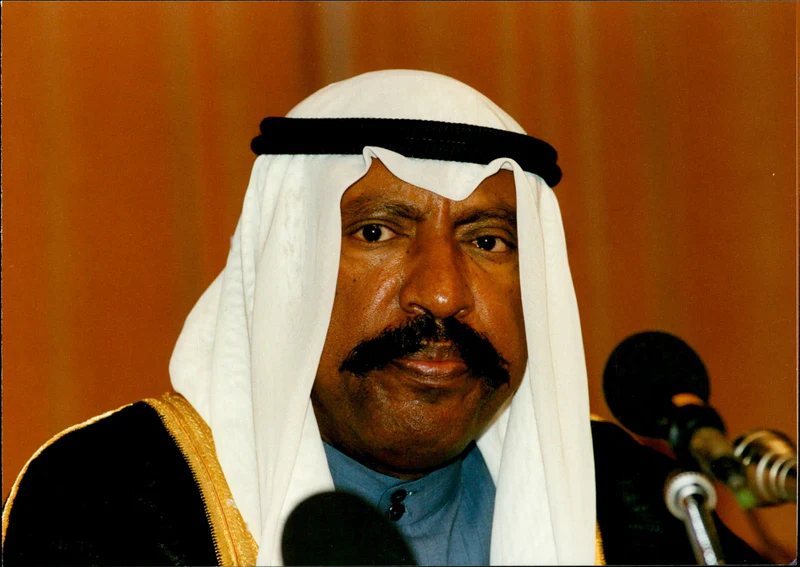risques-niger.org – Emir Saad Al-Abdullah Al-Salim Al-Sabah’s reign in 2006 was the shortest in the history of Kuwait, lasting just nine days. His accession followed the death of his half-brother, Emir Jaber Al-Ahmad Al-Sabah, but due to serious health issues, Emir Saad was unable to fully assume the responsibilities of leadership. Despite the brevity of his reign, Emir Saad had a long and distinguished career in Kuwaiti politics, serving as Crown Prince and Prime Minister for nearly three decades prior to his brief time as emir. His role in Kuwait’s political and security landscape, especially during the Iraqi invasion, left a lasting impact on the nation.
Early Life and Political Career
Saad Al-Abdullah Al-Salim Al-Sabah was born in 1930 into the ruling Al-Sabah family. Like many members of Kuwait’s royal family, Saad received a traditional education and later joined the military, where he trained both domestically and abroad. His early military career helped shape his understanding of defense and security, which would become central to his future roles in government.
In 1965, he was appointed as Kuwait’s Minister of Interior, a role in which he gained a reputation for enhancing the country’s internal security and police force. In 1967, he was also appointed as Minister of Defense, further solidifying his influence in Kuwait’s security affairs.
His experience in these key ministries led to his appointment as Crown Prince in 1978 by his half-brother, Emir Jaber Al-Ahmad Al-Sabah. Along with the title of Crown Prince, Saad also served as Prime Minister, a position he held for nearly 25 years, overseeing the day-to-day operations of the government.
Role During the Iraqi Invasion
One of the defining moments of Emir Saad’s career was his role during the Iraqi invasion of Kuwait in 1990. As Prime Minister, Saad played a key part in organizing Kuwait’s government-in-exile and maintaining the unity of the Kuwaiti people during this period of occupation. He worked closely with Emir Jaber to rally international support for Kuwait’s liberation, meeting with world leaders and advocating for the restoration of Kuwait’s sovereignty.
Following the liberation of Kuwait in 1991, Saad was instrumental in the reconstruction efforts, working to rebuild the country’s infrastructure and restore normalcy after the devastation of the war. His contributions during this critical time earned him the respect and admiration of the Kuwaiti people.
Ascension to the Throne
After the death of Emir Jaber Al-Ahmad Al-Sabah on January 15, 2006, Saad Al-Abdullah Al-Salim Al-Sabah, as Crown Prince, was next in line to ascend the throne. He was officially named the new Emir of Kuwait on January 15, 2006. However, by the time of his ascension, Emir Saad was already in poor health, having suffered from debilitating medical issues for several years.
As his health deteriorated, it became clear that Emir Saad would not be able to fulfill the duties required of the head of state. His ability to communicate and lead was severely compromised, leading to a constitutional crisis. The Kuwaiti parliament convened to address the issue, and after several days of deliberations, it became apparent that Emir Saad’s medical condition would prevent him from effectively governing the country.
Abdication and Succession
On January 24, 2006, just nine days after becoming emir, Saad Al-Abdullah Al-Salim Al-Sabah officially abdicated the throne, making his reign the shortest in Kuwait’s history. The decision was made in the best interest of the nation, and Emir Saad agreed to step down to allow for a smooth transition of power.
Following his abdication, the Kuwaiti parliament confirmed Sheikh Sabah Al-Ahmad Al-Jaber Al-Sabah, the long-serving Foreign Minister and half-brother of the late Emir Jaber, as the new ruler of Kuwait. Sheikh Sabah had already been acting as de facto leader during Emir Saad’s brief reign due to his experience and leadership within the government.
Legacy and Later Life
Despite his short reign, Emir Saad Al-Abdullah Al-Salim Al-Sabah’s legacy extends far beyond his brief time as ruler. His long tenure as Crown Prince and Prime Minister, particularly during the Iraqi invasion, left a lasting mark on Kuwait’s political history. He is remembered for his dedication to the country’s security, his leadership during the Gulf War, and his role in rebuilding Kuwait after the war.
Following his abdication, Emir Saad retired from public life, living quietly until his death on May 13, 2008, at the age of 78. His passing marked the end of an era for Kuwait, as he had been a prominent figure in the country’s political life for more than four decades.
Conclusion
Although Emir Saad Al-Abdullah Al-Salim Al-Sabah’s reign was the shortest in Kuwaiti history, his contributions to the country’s development and security cannot be overlooked. His leadership during the Iraqi invasion and his long service as Crown Prince and Prime Minister made him a key figure in Kuwait’s modern history. Emir Saad’s legacy is one of resilience, service, and dedication to the welfare of the Kuwaiti people, and he is remembered with respect and gratitude for his long-standing commitment to his country.
